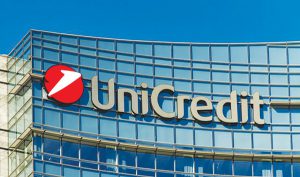Bloomberg
Europe’s largest banks kicked off earnings season with pledges to return more than $12 billion to shareholders, following an interest rate bonanza that’s bolstering lenders from Milan to Stockholm.
UBS Group AG Chief Executive Officer Ralph Hamers vowed to return more than $6.7 billion to shareholders this year, after income from lending to wealthy clients surged in the fourth quarter. His counterpart at UniCredit Spa, Andrea Orcel, promised to distribute $5.67 billion. Both linked the payouts, a combination of buybacks and dividends, to rising interest rates.
Europe’s banks are eager to reward shareholders after years of underperformance, as the end to the region’s experiment with negative interest rates powers big gains in lending income. While the European Central Bank (ECB) has indicated it wants firms to take a cautious approach when returning some of those windfall profits, executives so far are confident they’ll be able to proceed.
UniCredit had “extensive talks with the ECB and they are supportive,†Orcel said in an interview. “We are not eroding the capital with our distribution plan.â€
Orcel’s announcement comes after UniCredit last month disclosed that the ECB increased the amount of capital the Italian lender needs to maintain. UniCredit said at the time that the ECB’s decision wouldn’t affect its payout plans.
Net interest income at the Italian lender jumped 43% from a year earlier, fueling profit in the fourth quarter that came in twice as high as analysts had expected.
At UBS, which plans to repurchase more than $5 billion of shares this year and pay a dividend of 55 cents a share, income from lending at wealth management unit rose 35%.
The bank is guiding for more tailwinds from higher rates in the current quarter, which should lead to higher income from lending for the full year.
Swedish lender Swedbank AB, which also reported fourth-quarter results Tuesday, said it plans to return about $1 billion to investors through dividends this year. Net interest income broke through the threshold of 10 billion kronor for the first time ever, according to data compiled by Bloomberg dating back to 1999.
The Swedish central bank was one of the first European central banks to start raising rates early last year, helping push Swedbank’s fourth-quarter net interest income up by 62% last quarter.
 The Gulf Time Newspaper One of the finest business newspapers in the UAE brought to you by our professional writers and editors.
The Gulf Time Newspaper One of the finest business newspapers in the UAE brought to you by our professional writers and editors.
